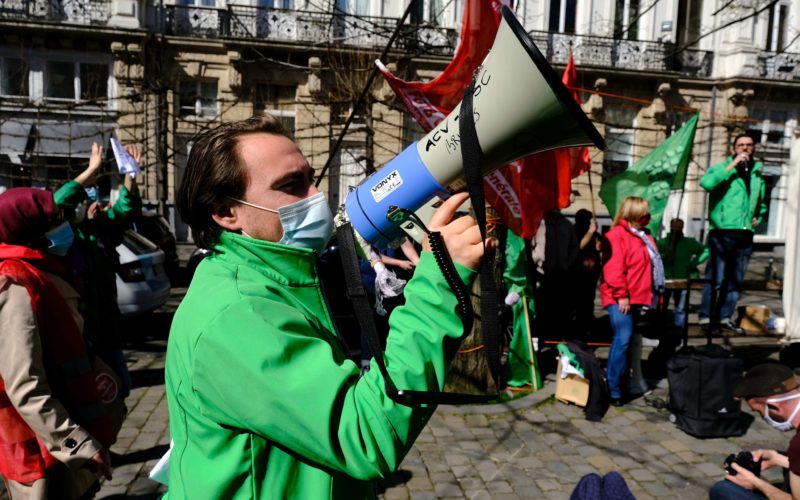Business
Strike at Distribution Centers Could Lead to Shortages at British Columbia Pot Shops

A strike at British Columbia’s only wholesaler and distributor of regulated cannabis strikes could force retailers in the province to shut down temporarily.
Workers at British Columbia’s only wholesaler and distributor of regulated cannabis products went on strike this week, leaving the province’s legal pot shops scrambling to ensure they have enough product to keep their doors open. Workers with the British Columbia General Employees’ Union (BCGEU), which represents about 33,000 service industry employees, set up picket lines at four distribution centers operated by the BC Liquor Distribution Branch (BCLDB) on Monday in an effort to gain higher wages from their employer.
On Wednesday, the BCLDB announced that because of the labor action, the cannabis distribution centers will be temporarily unable to accept or fill orders, process invoices or ship merchandise to the province’s licensed retailers.
“We sincerely apologize for this disruption and for the impact to your business,” the distributor wrote in a statement to stores published on its website.
Provincial officials have been working on a plan to allow cannabis retailers to accept deliveries directly from licensed producers. But until the plan goes into effect, the BCLBD is the only wholesaler and distributor for the province’s weed dispensaries.
“The BC Liquor Distribution Branch recognizes the current job action being taken by the BC General Employee’s Union may be concerning to wholesale and retail customers,” the distributor in a statement quoted by the CBC, adding that the B.C. Cannabis Store website is also unable to fill or deliver customer orders.
“We do not know the extent of any future job action and therefore cannot speculate on the inventory levels held by wholesale customers nor customer demand and buying behaviours in this dynamic environment,” the distributor added.
Strike Could Lead to Shortages and Store Closures
Cannabis retailers in British Columbia are left to speculate on the effect the distribution center strike will have on their businesses. Omar Khan, the senior vice president of corporate and public affairs for High Tide, said that the company’s chain of Canna Cabana stores faces impending shortages if the strike does not end quickly, adding that it could have long-standing implications for the regulated cannabis industry.
“For the time being, we are managing the situation by reallocating inventory between our British Columbia stores, but if the job action is not resolved within the next 10 days, we could face inventory issues,” said Khan. “We urge the BCLDB and the BCGEU to resolve their dispute as soon as possible, as lack of inventory at licensed cannabis stores risks driving consumers back into the hands of the illicit market, which will endanger public health and drive much-needed revenue away from government coffers.”
Other retailers are worried that the strike will force them to close their stores until the labor dispute is resolved.
“If it lasts more than two weeks, then we are probably looking at closing down the store because there is nothing to sell,” said Jacob Michalow, the assistant general manager at Marigolds Cannabis in Vancouver.
Vikram Sachdeva estimated that his chain of Seed and Stone stores currently has an adequate supply of products, but said that the situation could change in the event of an extended strike.
“I’m hoping that we can survive for a week or a little bit longer, but beyond that point, it’s going to be very difficult,” said Sachdeva, adding that he wished that retailers were given more notice of the labor action.
“It just came as a bit of a shock, and … now the concern is how long before they start delivering to us so that we don’t start running out of products?” he said.
Sachdeva said that he is worried he will have to turn customers away if he runs out of product and fears that medical marijuana patients will have difficulties accessing their medicine. He also expressed concerns that customers who are disappointed by a lack of regulated cannabis will turn to the illicit market instead.
Jaclyn Pehota, the executive director of the Association of Canadian Cannabis Retailers, noted that bars and restaurants are able to better cope with the strike because they can also buy products from private wineries and craft breweries if they are unable to receive goods from the distribution centers.
“That is something that we’re calling on government to explore,” said Pehota. “We would like the same diversity of supply chain for cannabis retail.”
David Hurford, secretary of the B.C. Farmers Craft Co-op, agreed, saying that many consumers in the province are able to find illicit sources of cannabis if licensed dispensaries run out of merchandise.
“We completely respect the union’s right to take this action, but it is up to the government to have a contingency plan in place,” Hurford said.
Business
New Mexico cannabis operator fined, loses license for alleged BioTrack fraud

New Mexico regulators fined a cannabis operator nearly $300,000 and revoked its license after the company allegedly created fake reports in the state’s traceability software.
The New Mexico Cannabis Control Division (CCD) accused marijuana manufacturer and retailer Golden Roots of 11 violations, according to Albuquerque Business First.
Golden Roots operates the The Cannabis Revolution Dispensary.
The majority of the violations are related to the Albuquerque company’s improper use of BioTrack, which has been New Mexico’s track-and-trace vendor since 2015.
The CCD alleges Golden Roots reported marijuana production only two months after it had received its vertically integrated license, according to Albuquerque Business First.
Because cannabis takes longer than two months to be cultivated, the CCD was suspicious of the report.
After inspecting the company’s premises, the CCD alleged Golden Roots reported cultivation, transportation and sales in BioTrack but wasn’t able to provide officers who inspected the site evidence that the operator was cultivating cannabis.
In April, the CCD revoked Golden Roots’ license and issued a $10,000 fine, according to the news outlet.
The company requested a hearing, which the regulator scheduled for Sept. 1.
At the hearing, the CCD testified that the company’s dried-cannabis weights in BioTrack were suspicious because they didn’t seem to accurately reflect how much weight marijuana loses as it dries.
Company employees also poorly accounted for why they were making adjustments in the system of up to 24 pounds of cannabis, making comments such as “bad” or “mistake” in the software, Albuquerque Business First reported.
Golden Roots was fined $298,972.05 – the amount regulators allege the company made selling products that weren’t properly accounted for in BioTrack.
The CCD has been cracking down on cannabis operators accused of selling products procured from out-of-state or not grown legally:
- Regulators alleged in August that Albuquerque dispensary Sawmill Sweet Leaf sold out-of-state products and didn’t have a license for extraction.
- Paradise Exotics Distro lost its license in July after regulators alleged the company sold products made in California.
Golden Roots was the first alleged rulebreaker in New Mexico to be asked to pay a large fine.
Source: https://mjbizdaily.com/new-mexico-cannabis-operator-fined-loses-license-for-alleged-biotrack-fraud/
Business
Marijuana companies suing US attorney general in federal prohibition challenge

Four marijuana companies, including a multistate operator, have filed a lawsuit against U.S. Attorney General Merrick Garland in which they allege the federal MJ prohibition under the Controlled Substances Act is no longer constitutional.
According to the complaint, filed Thursday in U.S. District Court in Massachusetts, retailer Canna Provisions, Treevit delivery service CEO Gyasi Sellers, cultivator Wiseacre Farm and MSO Verano Holdings Corp. are all harmed by “the federal government’s unconstitutional ban on cultivating, manufacturing, distributing, or possessing intrastate marijuana.”
Verano is headquartered in Chicago but has operations in Massachusetts; the other three operators are based in Massachusetts.
The lawsuit seeks a ruling that the “Controlled Substances Act is unconstitutional as applied to the intrastate cultivation, manufacture, possession, and distribution of marijuana pursuant to state law.”
The companies want the case to go before the U.S. Supreme Court.
They hired prominent law firm Boies Schiller Flexner to represent them.
The New York-based firm’s principal is David Boies, whose former clients include Microsoft, former presidential candidate Al Gore and Elizabeth Holmes’ disgraced startup Theranos.
Similar challenges to the federal Controlled Substances Act (CSA) have failed.
One such challenge led to a landmark Supreme Court decision in 2005.
In Gonzalez vs. Raich, the highest court in the United States ruled in a 6-3 decision that the commerce clause of the U.S. Constitution gave Congress the power to outlaw marijuana federally, even though state laws allow the cultivation and sale of cannabis.
In the 18 years since that ruling, 23 states and the District of Columbia have legalized adult-use marijuana and the federal government has allowed a multibillion-dollar cannabis industry to thrive.
Since both Congress and the U.S. Department of Justice, currently headed by Garland, have declined to intervene in state-licensed marijuana markets, the key facts that led to the Supreme Court’s 2005 ruling “no longer apply,” Boies said in a statement Thursday.
“The Supreme Court has since made clear that the federal government lacks the authority to regulate purely intrastate commerce,” Boies said.
“Moreover, the facts on which those precedents are based are no longer true.”
Verano President Darren Weiss said in a statement the company is “prepared to bring this case all the way to the Supreme Court in order to align federal law with how Congress has acted for years.”
While the Biden administration’s push to reschedule marijuana would help solve marijuana operators’ federal tax woes, neither rescheduling nor modest Congressional reforms such as the SAFER Banking Act “solve the fundamental issue,” Weiss added.
“The application of the CSA to lawful state-run cannabis business is an unconstitutional overreach on state sovereignty that has led to decades of harm, failed businesses, lost jobs, and unsafe working conditions.”
Business
Alabama to make another attempt Dec. 1 to award medical cannabis licenses

Alabama regulators are targeting Dec. 1 to award the first batch of medical cannabis business licenses after the agency’s first two attempts were scrapped because of scoring errors and litigation.
The first licenses will be awarded to individual cultivators, delivery providers, processors, dispensaries and state testing labs, according to the Alabama Medical Cannabis Commission (AMCC).
Then, on Dec. 12, the AMCC will award licenses for vertically integrated operations, a designation set primarily for multistate operators.
Licenses are expected to be handed out 28 days after they have been awarded, so MMJ production could begin in early January, according to the Alabama Daily News.
That means MMJ products could be available for patients around early March, an AMCC spokesperson told the media outlet.
Regulators initially awarded 21 business licenses in June, only to void them after applicants alleged inconsistencies with how the applications were scored.
Then, in August, the state awarded 24 different licenses – 19 went to June recipients – only to reverse themselves again and scratch those licenses after spurned applicants filed lawsuits.
A state judge dismissed a lawsuit filed by Chicago-based MSO Verano Holdings Corp., but another lawsuit is pending.
Source: https://mjbizdaily.com/alabama-plans-to-award-medical-cannabis-licenses-dec-1/
-

 Business2 years ago
Business2 years agoPot Odor Does Not Justify Probable Cause for Vehicle Searches, Minnesota Court Affirms
-

 Business2 years ago
Business2 years agoNew Mexico cannabis operator fined, loses license for alleged BioTrack fraud
-

 Business2 years ago
Business2 years agoAlabama to make another attempt Dec. 1 to award medical cannabis licenses
-

 Business2 years ago
Business2 years agoWashington State Pays Out $9.4 Million in Refunds Relating to Drug Convictions
-

 Business2 years ago
Business2 years agoMarijuana companies suing US attorney general in federal prohibition challenge
-

 Business2 years ago
Business2 years agoLegal Marijuana Handed A Nothing Burger From NY State
-

 Business2 years ago
Business2 years agoCan Cannabis Help Seasonal Depression
-

 Blogs2 years ago
Blogs2 years agoCannabis Art Is Flourishing On Etsy













